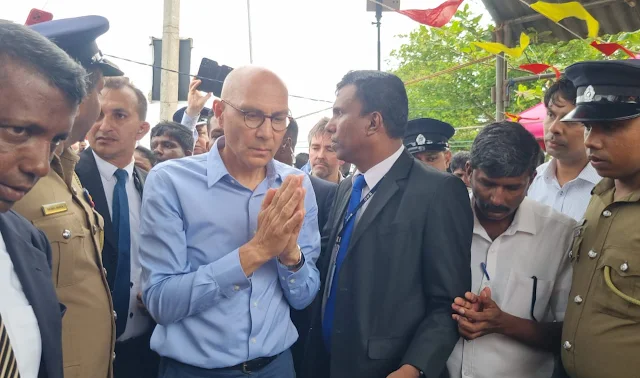UN High Commissioner for Human Rights, Volker Türk visited North and Eastern provinces today and met with war victims, including relatives of missing persons during his three-day official visit to the country.
During his visit to North today (25), High Commissioner Turk visited the Chemmani mass grave site and met with protesters who have been on a continuous protest called ‘Anaiya Vilakku’ for the last three days near the grave site.
The protesters handed over a petition urging to conduct an impartial international investigation into alleged human rights violations that occurred during the final phases of the 2009 war in the country, and continue the process of gathering evidence by a UN mechanism.
Earlier today, High Commissioner Turk visited the Trincomalee district, where he met with representatives of civil society organisations in the Eastern Province, including members of the Association of Relatives of the Forced Disappeared at the Jubilee Hall located on College Road.
Meanwhile, a protest was staged outside the venue, jointly organised by victims from the Eastern Province, the North-Eastern Social Movement, and other civil groups.
In the memorandum handed over to the UN High Commissioner for Human Rights, the North- East based civil societies noted successive governments in Sri Lanka have consistently failed to prevent the war crimes and crimes against humanity perpetrated against the Tamil people, particularly in the North and East, since historical times.
“Instead of ensuring peace and justice, even 15 years after the end of the armed conflict, these governments have effectively forced the people of the North and East to live under conditions akin to a shadow war,”
Currently, both the civil and security apparatuses of the Sri Lankan state remain instruments of oppression against the Tamil people in the North and East, the statement said. In these regions, more than seven different state mechanisms have systematically appropriated the residential and livelihood lands of Tamil-speaking communities either through flawed legal processes or without any legal basis at all. As a result, Tamils are being displaced from their ancestral lands.
“ These actions are perceived as calculated attempts to erase the identity of the Tamil people, undermine their political representation, and push them towards a state of planned genocide. To this day, many human rights defenders, activists, and affected individuals have been subjected to intimidation and surveillance orchestrated by Sri Lanka’s military and intelligence apparatus,” the statement said.
Moreover, the Sri Lankan state has consistently failed to disclose the truth about those who forcibly disappeared, or to take responsibility for the war crimes, acts of genocide, mass graves, and human rights violations committed during the conflict, the statement said. “ Instead, the state has sought to evade accountability through diplomatic maneuvering,”
The collective statement also pointed out that Sri Lanka continues to deny visas to members of the OHCHR Sri Lanka accountability project (OSLAP) under Resolution 46/1 of the UN Human Rights Council and has refused to cooperate or support the implementation of this initiative in any meaningful way. (Pixs- Theva Athiran & N. Lohathayalan)






.jpg)

Post a Comment